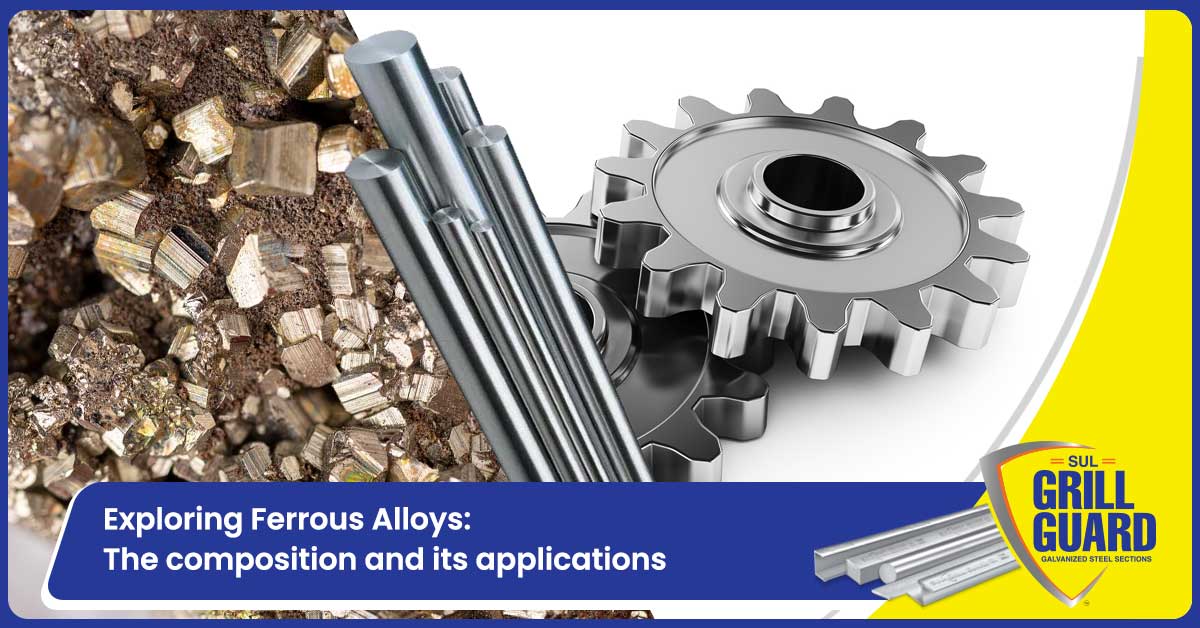Because of its special features and flexibility, ferrous alloys are key factors in the development of different industries and applications. In this blog, we will discuss the composition, types, properties, and common applications of ferrous alloys.
What Are Ferrous Alloys?
Ferrous alloys are metallic materials that have iron (Fe) as the main metal and some others, such as carbon (C), manganese (Mn), silicon (Si), nickel (Ni), chromium (Cr), and molybdenum (Mo), as additions. The alloying of these elements, in short, gives the alloy these specific properties; thus, the alloy becomes perfect for different industrial uses.
Composition of Ferrous Alloys
1. Carbon Steel: This is one of the most usual types of ferrous alloys, made up of iron and carbon. The range of the carbon content can be as low as 0. 05% to around 2. When the carbon content is decreased to zero %, the hardness and strength are increased, but the ductility and weldability are reduced.
2. Stainless Steel: Stainless steel is a combination of iron, chromium, nickel, and sometimes other elements such as molybdenum and titanium. It is admired for its corrosion resistance, high strength, and beauty, hence its popularity in the construction, automotive, and kitchenware industries.
3. Alloy Steel: Alloy steels, on the other hand, have some extra alloying elements, such as manganese, silicon, nickel, chromium, and molybdenum. They provide the mechanical properties of higher strength, hardness, and wear resistance than carbon steel with the assistance of these alloys.
4. Cast Iron: Cast iron is an iron alloy with a high carbon content (2% to 4%) and small amounts of silicon. It has the features of being easily cast, the best machinable,, and the high compressive strength,, making it suitable for applications like engine blocks, pipes, and cookware.
Properties of Ferrous Alloys
The properties of the ferrous alloys depend upon their composition and heat treatment. Some common properties include:
Strength: Ferrous alloys possess high tensile and compressive strength, which makes them dependable for structural applications in construction and machinery.
Hardness: The introduction of alloying elements like chromium and molybdenum enhances hardness, wear resistance, and durability.
Corrosion Resistance: Stainless steel alloys are corrosion-resistant, which makes them best for the marine, chemical, and food processing industries.
Machinability: Some ferrous alloys, like cast iron, are good for machinability and casting properties; thus, they can be used to construct complex shapes and structures.
Applications of Ferrous Alloys
Construction: Because of their strength and durability, the construction industry uses ferrous alloys for its components, reinforcement bars, roofing materials, and infrastructure projects.
Automotive: Car parts and components, such as engine blocks, chassis, exhaust systems, and body panels, are ferrous alloys with, which are known for their mechanical properties and reliability.
Machinery and Equipment:
Ferrous alloys are the main components in machinery and equipment manufacturing, where high strength, wear resistance, and precision are the most important. In the fields mentioned, gears, bearings, shafts, valves, and tools are the main products made using.
Household Products:
The most notable characteristic of stainless steel is its popularity in household products such as kitchenware, appliances, cutlery, and home fixtures because of its aesthetic appeal, hygiene, and corrosion resistance.
In summary, ferrous alloys are crucial to numerous industries and applications and have a wide range of properties and capabilities. Understanding materials, their properties, and their applications is the main issue for engineers, manufacturers, and consumers to make the right choice about the materials for different sectors of the economy.
Thus, if you are looking to get the best ferrous alloys for your upcoming construction project or for any application purpose, you may contact HMB, where you can find the top-class ferrous alloys with a guarantee.







